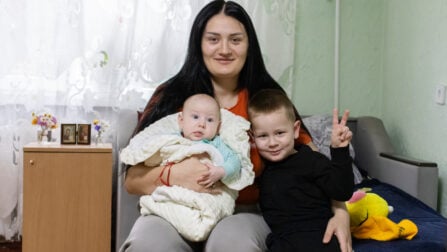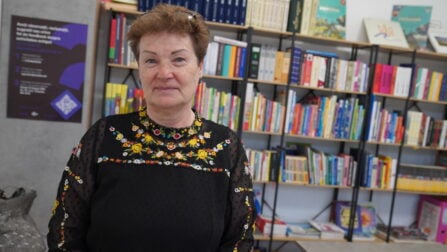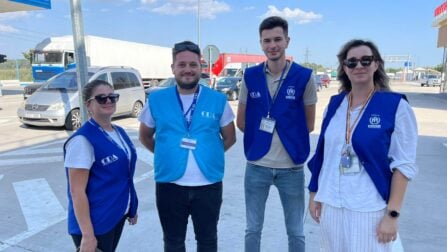Chișinău, Moldova – 31 March 2025 – Between July 2023 and March 2025, the UN Refugee Agency (UNHCR), reached over 78,000 people—including refugees from Ukraine and vulnerable Moldovans—with critical assistance to meet their basic needs, enhance protection, and promote long-term inclusion in national systems. This multi-sectoral humanitarian response was funded by a generous EUR 15 million allocation from the European Union Humanitarian Aid Operations.
With this contribution, UNHCR provided cash assistance to the most vulnerable refugee households, enabling them to cover essential expenses such as food, rent, and while also generating a positive impact on the local economy.
This action also reinforced protection services across Moldova. UNHCR expanded its network of protection desks, offering individual case support, information services, and referrals to specialized assistance. Protection monitoring was conducted regularly throughout 2024, enabling a data-informed response to the evolving refugee needs, identifying rights concerns, and ensuring timely interventions for those most at risk.
Beyond direct assistance, this humanitarian aid action invested in building Moldova’s capacity to sustainably include refugees in public systems. With support from the European Union, UNHCR worked closely with national and local authorities to strengthen access to education, social protection, employment, and health services for refugees. The humanitarian aid action helped bridge service gaps, support policy reforms, and foster area-based strategies tailored to local integration needs. As a result, Moldova is better prepared to shift from temporary protection models to long-term solutions, with action plans and systems now in place to support inclusive governance.
“The European Union remains committed to supporting both refugees and the Moldovan communities that have welcomed them. Through our partnership with UNHCR, we are ensuring that the most vulnerable receive the assistance they need—whether it’s financial support, protection services, or access to essential public systems,” said Marianna Franco, Head of the European Union Humanitarian Aid in Ukraine and Moldova.
To prepare for and mitigate the impact of the winter season, UNHCR, with support from the European Union and other donors distributed essential non-food items (NFIs)—such as blankets, heaters, and winter clothing—to 4,000 refugees and vulnerable Moldovans between November 2024 and March 2025. This winterization effort complemented national programs and supported households most affected by the cold. Additionally, UNHCR transferred contingency stocks of essential items to government facilities, enhancing Moldova’s emergency preparedness for future crises.
UNHCR is deeply grateful to the European Union for its generous support, which has been instrumental in enabling UNHCR’s operations in Moldova. This partnership has made a tangible difference in the lives of refugees and vulnerable communities, helping to meet urgent needs and foster long-term resilience.



Share on Facebook Share on Twitter